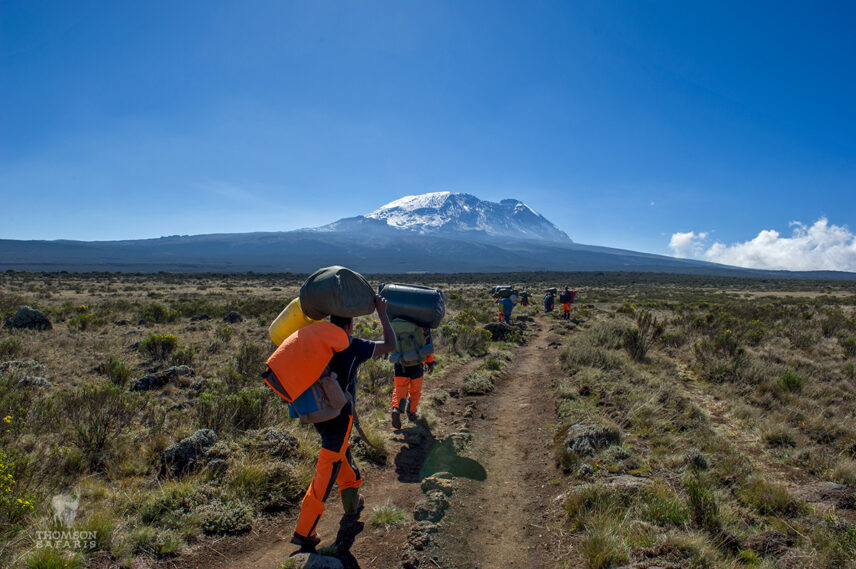Thomson sets “the premier standard for ethical treatment of Kilimanjaro porters,” according to the Kilimanjaro Porters Assistance Project (KPAP). What does that mean? Let’s talk about the specifics: pay, equipment and accountability.
Some of the Highest Wages for Guides and Porters on Kili
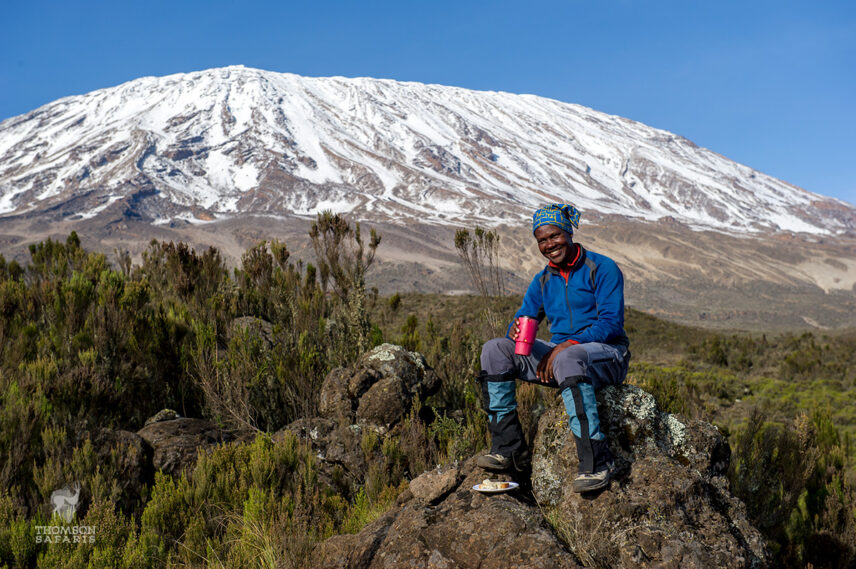
Paying guides and porters well is incredibly important to us. The porters are paid much higher than the KPAP 2016 partner average. And there’s much more that goes into this.
An Unrivaled Porter Database
A porter database ensures no individual is overworked. It also prevents any attempt to pay in exchange for work and ensures all individuals work based on skill and experience alone. No other outfitter maintains a similar database.
A Tipping System Built by Staff, KPAP and Porters
Staff, KPAP and the porters themselves designed a tipping system that ensures tips go exactly where they’re intended – to the individual porters and guides.
Bank Accounts for All
Staff worked with over 700 porters to individually set up their respective bank accounts. No other outfitters use electronic bank deposit systems to pay porters.
In fact, many porters on Kili don’t have bank accounts at all. Your porters are paid securely, efficiently and fairly.
Equipment:
Every Porter is Outfitted with Professional-Grade Uniforms
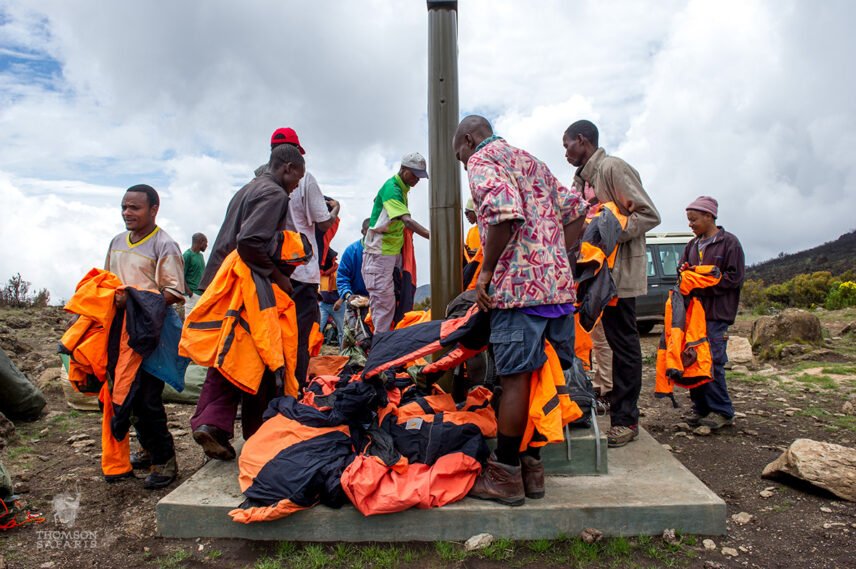
You wouldn’t climb Kili without the right footwear or jacket. We don’t think porters should either. That’s why your porters receive professional-grade, all-weather uniforms, including hats, gloves, footwear, warm layers and mountaineering glasses.
Much more is done to equip and prepare porters to the highest possible standard.
Safe, Comfortable, Custom Tents
Your porters need rest to wake up early and tackle their duties (supporting you) effectively. That’s why they’re assigned specific crew arrangements in specially designed tents with closed-cell sleeping pads, keeping them warm, dry and comfortable. No other outfitter does this for every porter.
Three Meals Per Day
Porters elsewhere often eat one meal per day. Your porters receive three.
Weight Load Maximums
The maximum porter carrying weight is 20kg to ensure porter safety, climbing efficiency and ethical treatment.
Ethical Division of Labor
Your porters are never overloaded with responsibilities. Cooks carry nothing, and waiters, campsite managers and assistant cooks carry half weight to conserve energy for camp duties.
Accountability:
Constantly Collecting Feedback and Improving
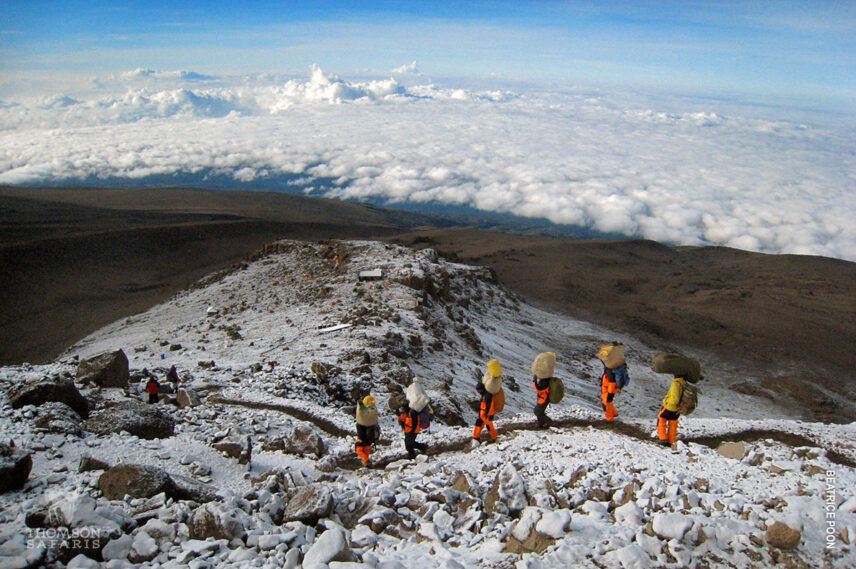
KPAP requires specific porter treatment guidelines for its members. To us, these are a starting point. Every trekking detail is under review at all times. In fact, there is personnel on Kilimanjaro specifically for this.
There are two Porter Welfare officers who ensure proper treatment and review practices on the mountain. They work in tandem with a trek operations general manager and meet with all crews twice per year. No other KPAP partner meets with porters as frequently.
And independent reviews are important, too. A KPAP report from an investigative porter is provided on every climb. Negative feedback is reviewed immediately, and changes are made.
Constant review means constant improvement, which is the only way to provide the best porter treatment on Kili year after year.
Why are Porter Ethics Important for Trekkers?
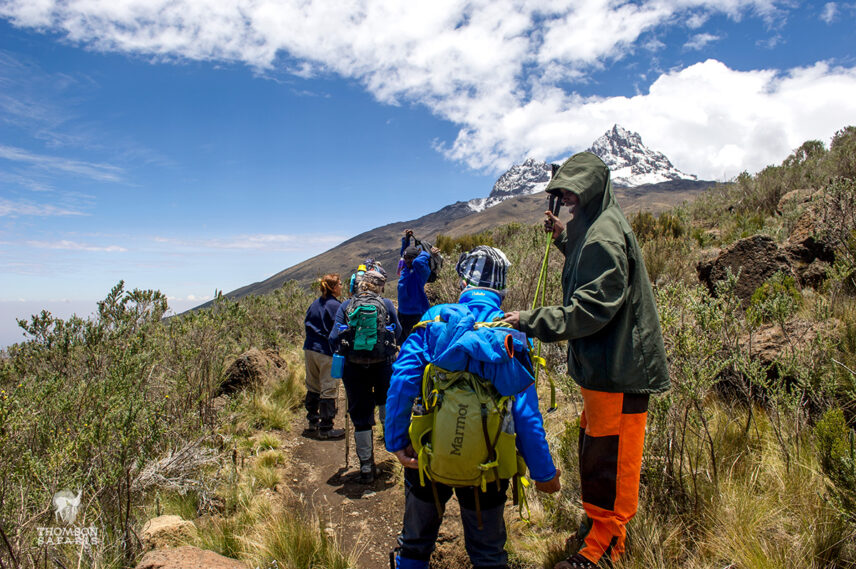
We’ve known many of your guides and porters for years, and we know treating them well is simply the right thing to do. Still, this may not translate to trekkers on a budget. For those on a budget, there are two big reasons you should strongly consider porter ethics.
1. The way porters are treated does impact your ability to successfully summit Kilimanjaro.
Porters are your support system. When your support system is compromised, summit success rates plummet.
Why?
The most skilled and capable porters and guides are attracted to outfitters that treat them the best. By choosing an outfitter with high porter standards, you partner with the best team and give yourself the greatest chance of conquering the mountain.
We’re very proud of our 98% summit success rate, compared to Kili’s roughly 45% average, and we could not achieve that stellar rate without peerless porter treatment.
2. You will form a connection with your porters – our guests consistently tell us so!
When you treat porters right, it makes all the difference.
A story from Thomson guest Jackie Gero provides a great example:
“The true heroes for the climb were all of the porters. Carrying all of that weight, they would be at the camp before our arrival with our campsite set up and ready for us. I could ask any porter if I had a problem and would get immediate attention!
The guide asked if we would like him to ask for volunteers from the porters to carry our day packs the day of the summit to conserve our energy for the long day. They would be strictly volunteer, as this was not part of their normal duties.
Thus, the day of the summit there were five volunteers from the porters to assist us in the most difficult day of the climb! As you know, this was a very, very, very long day! An act of selflessness on the part of five porters helped us achieve my lifetime goal of the summit.”
This is a perfect example of the Thomson difference. Thomson’s support for porters ensures the best support for you. Unfortunately, not every outfitter treats porters as well as Thomson does.
What Does Porter Mistreatment Look Like?
You may see telltale signs of porter mistreatment on Kili – inappropriate footwear, enormous weight loads, makeshift tents, and there are less-observable signs, like poor pay, bribery, and tip skimming.
Proper porter treatment is expensive, which makes the trek more expensive for travelers. When travelers look for the cheapest deals, they may unknowingly use entities that cut corners and mistreat porters to save money.
The best way to avoid these groups is to use a KPAP partner and ask some specific questions about porter accommodations:
- How well are porters paid compared to the KPAP partner average?
- Are they provided personal equipment, such as jackets and boots?
- Are they provided suitable tents for Kilimanjaro’s conditions?
- How are their tips handled?
- Do they have maximum carry weight limits?
- Are they guaranteed pay in the event of illness or injury?
- How often are they fed?
